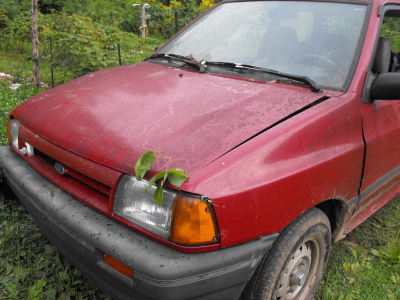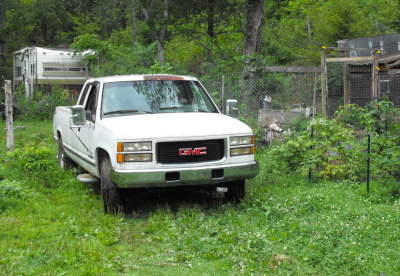
RIP, Little Blue
 My
darling little blue Festiva, the first and only car I've ever owned,
kicked the bucket. (Her sister is pictured here.) Our very
competent and cheap mechanic explained that when the timing belt broke,
it knocked a bunch of things apart in there, and that it would cost
$500 to fix it. My gut reaction was, "I don't care! Fix
her!" But after crunching the numbers, I'm afraid we're going to
let her go.
My
darling little blue Festiva, the first and only car I've ever owned,
kicked the bucket. (Her sister is pictured here.) Our very
competent and cheap mechanic explained that when the timing belt broke,
it knocked a bunch of things apart in there, and that it would cost
$500 to fix it. My gut reaction was, "I don't care! Fix
her!" But after crunching the numbers, I'm afraid we're going to
let her go.
I estimate that we drive
around $10,000 miles per year, and when I started crunching the
numbers, I realized that 75% of that time, we're hauling supplies and
have to use the truck or the
van. Another 20% of the time, Mark's driving on long trips and
doesn't feel like cramming his tall frame into a clown car, so it's
only the 5% of the time I drive by myself that we were using the
Festiva. Her selling point is her great gas mileage (over 40
miles to the gallon), but at current gas prices and driving methods, it
would take 50 more years driving her to make it worthwhile to fix the
Festiva.
 So I went on to consider a
couple of other options. The truck and the van fit a similar
niche since we've taken the back seats out of the van and use that area
for hauling supplies. If we sold the van (estimated value $500)
and bought a good gas mileage car to replace the Festiva, making sure
we choose one that's big enough to fit Mark's long legs (estimated cost
$2,000), then we could probably use the lower mileage vehicle 25% of
the time. At current gas prices, that would save us around $400
per year, which means the switch would be worthwhile in around 4
years. On the other hand, you have to factor in a major hassle
value for selling the van and buying a used car, and the possibility
that we'd get a lemon.
So I went on to consider a
couple of other options. The truck and the van fit a similar
niche since we've taken the back seats out of the van and use that area
for hauling supplies. If we sold the van (estimated value $500)
and bought a good gas mileage car to replace the Festiva, making sure
we choose one that's big enough to fit Mark's long legs (estimated cost
$2,000), then we could probably use the lower mileage vehicle 25% of
the time. At current gas prices, that would save us around $400
per year, which means the switch would be worthwhile in around 4
years. On the other hand, you have to factor in a major hassle
value for selling the van and buying a used car, and the possibility
that we'd get a lemon.
The final option would
be to stick with the van and truck and just admit that we're not the
kind of family where it makes sense to have a gas efficient
vehicle. We don't commute, we don't drive separately (because I
hate to drive), and we're often hauling big masses of compost or mulch
or chicken waterer supplies that won't fit in a passenger car. In
that case the question remains --- what do we do with the
Festiva? Mark rolled his eyes when I suggested hauling her home
to use as parts for the parts Festiva (and as a solar
dryer.)
Want more in-depth information? Browse through our books.
Or explore more posts by date or by subject.
About us: Anna Hess and Mark Hamilton spent over a decade living self-sufficiently in the mountains of Virginia before moving north to start over from scratch in the foothills of Ohio. They've experimented with permaculture, no-till gardening, trailersteading, home-based microbusinesses and much more, writing about their adventures in both blogs and books.
Want to be notified when new comments are posted on this page? Click on the RSS button after you add a comment to subscribe to the comment feed, or simply check the box beside "email replies to me" while writing your comment.

A timing belt is one of those things you should have replaced at the precribed intervals, just because the repair can be so costly. With a bit of bad luck you get a valve hitting a piston.
In some cars you even have to take the engine out to get at the timing belt.
If you do get another car, think about e.g. an older mercedes diesel (with a mechanical injection pump). Those cars are quite sturdy, and can run up hundreds of thousands of miles. And unlike some modern diesels, those oldies are relatively easy to run on straight vegetable oil or recycled frying oil if you'd like.
Bladerunner --- I always assumed your car had to actually be running to donate to those charities?
Roland --- Mark told me that we should have gotten the belt changed, but that it's often so expensive that people usually wait until they break. Of course, the car had nearly 300,000 miles on it, so it was only a matter of time until something really bad happened to her and made her not worth fixing.